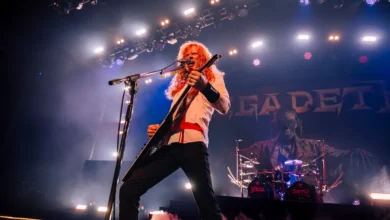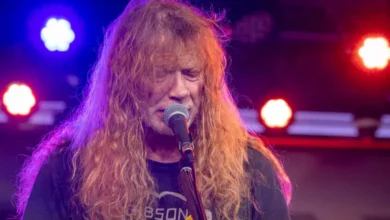Megadeth Ignites Buzz with “I Don’t Care” Music Video, Hinting at a Killer Album Ahead
When Megadeth dropped the official video for “I Don’t Care,” it didn’t feel like just another single rollout—it felt like a statement. Fans had already been buzzing from teasers and the knowledge that this track would be part of the band’s self-titled final album, due in January 2026, but the moment the premiere countdown hit zero, it became clear this was something different. The video, loud in attitude even before a single note played, arrived framed by the looming reality that this era of Megadeth is the last, and that gave every frame a little extra voltage.
The build-up to the release was classic modern Megadeth: cryptic posts, short snippets, and just enough information to send fans into speculation mode. Was this going to be a thrash banger, a mid-tempo crusher, or something completely off-center? The title alone – “I Don’t Care” – promised defiance, and longtime listeners knew that when Dave Mustaine leans into that attitude, it’s rarely subtle. By the time the YouTube chat was flying past at hyperspeed, fans from multiple generations were lined up digitally around the block, ready to see how the band would frame this next chapter in their closing saga.
Then the video hit, and instead of the usual dystopian landscapes or band-in-a-warehouse tropes, viewers were thrown into a world of skaters bombing city streets, grinding rails, and wreaking gleeful havoc. The camera followed young punks spraying graffiti, dodging security, and carving their own lines through urban sprawl, all set to Megadeth’s snarling soundtrack. It looked less like a metal band’s promo clip and more like a cross between a classic skate VHS and a rebellious indie film, giving the song an immediate sense of motion, danger, and youthful chaos that perfectly matched its title.
Threaded through all that energy, though, was the unmistakable presence of Dave Mustaine. Rather than dominating every second of screen time, he appeared like a specter of pure attitude: guitar in hand, signature sneer intact, and, in some instantly iconic shots, flipping the middle finger straight at the camera. Those moments weren’t just shock gags—they felt like a thesis statement for the whole project. After four decades of carrying the flag for thrash metal, Mustaine seemed to be saying that he was still unafraid to antagonize, provoke, and push back against anyone expecting something polite or sanitized.
Musically, “I Don’t Care” leans into a punk-charged, stripped-down side of Megadeth that fans don’t always get in single form. The track is short, sharp, and sneering, driven by a main riff that Mustaine revealed had been sitting in his head since the sessions for their previous album. That makes the song feel like a bridge between eras: forged during the last album’s cycle but unleashed now, with the knowledge that the finish line is finally in sight. The guitars snap and snarl more than they sprawl, giving the whole thing that garage-punk-meets-thrash edge.
One of the most thrilling aspects of the track is the interplay between Mustaine and guitarist Teemu Mäntysaari. In interviews and press blurbs, Mustaine has singled out the way the song’s main rhythm part locks into heavier down-picking, then jumps into octave patterns before exploding into solos that volley back and forth between the two guitarists. You can practically hear them fencing with their instruments—one phrase answered by another, a lick tossed across the stereo field and returned with even more teeth. It’s a reminder that, even at the tail end of their recording career, Megadeth’s guitar work is still a core reason an entire generation of players picked up their first instrument.
Underneath all that fretwork sits a rhythm section that refuses to treat “punky” as an excuse to be sloppy. The bass punches through the mix with a tone that nods to the band’s classic late-’80s and early-’90s records while still sounding modern and sharp. The drumming doesn’t just keep time; it goads the song forward, alternating between tight, almost claustrophobic beats and explosive fills that match the visual energy of kids launching themselves off concrete ledges. It’s a compact track, but within that tight runtime the band finds ways to pack in layers of detail that reward repeated listens.
Visually, the narrative of the video unfolds in a way that mirrors the song’s lyrical sentiment. The skaters aren’t portrayed as villains or heroes; they’re shown as kids who have decided that the rules, at least for an afternoon, don’t apply to them. They tag walls, weave through traffic, and occasionally crash, but they always get back up, grinning. That carefree, borderline reckless spirit embodies exactly what Mustaine is singing about: the feeling of finally saying “I don’t care” out loud and meaning it, not as indifference, but as liberation from other people’s expectations. The more the video rolls, the more it feels like a love letter to youthful defiance rather than simple nihilism.
As the video cuts between the band and the skaters, there’s an interesting visual tension that emerges. On one side, you have a group of veterans who helped shape the genre, playing with precision and power that only decades of experience can produce. On the other, you have teenagers who probably weren’t even alive when Peace Sells came out, carving up their city to the sound of those same guitars. That cross-generational collision might be the most moving part of the whole clip: Megadeth, in their farewell era, sound-tracking the chaos and freedom of kids who are just beginning to write their own stories.
The timing of “I Don’t Care” also adds a layer of significance that’s hard to ignore. As the second single from what’s being billed as Megadeth’s final studio album, the song comes at a moment when every release feels like a chapter in the last book of a saga. Fans already know that a farewell tour is on the horizon and that 2026 will be a year of goodbyes: final shows, last curtain calls, and all the emotion that goes with them. Against that backdrop, dropping a snarling, punk-fueled anthem that basically flips off the world feels both perfectly on-brand and strangely cathartic.
Dave Mustaine’s comments about the single only heighten that sense of catharsis. When he says that everyone has wanted to tell someone “I don’t care” but rarely has the nerve, he’s tapping into that universal frustration that the song amplifies into something almost celebratory. Coming from someone who has spent his life navigating label demands, industry expectations, interpersonal drama, health scares, and the pressures of being both bandleader and brand, it’s easy to hear “I Don’t Care” as more than just a throwaway phrase. It sounds like a man choosing which weight to set down and which fire to keep burning.
Fan reaction has been intense and immediate. Within hours of the video going live, social media feeds filled with side-by-side comparisons to classic Megadeth tracks, arguments over where it sits in the band’s catalog, and, of course, endlessly replayed clips of Mustaine’s middle-finger shot. Some longtime listeners were surprised by the almost punk-rock brevity and attitude, while others embraced it instantly as a burst of old-school snark dressed up with modern production. Either way, the consensus forming among many is that “I Don’t Care” doesn’t feel like a band fading out; it feels like one more punch thrown before the final bell.
The video’s director, Keith J. Leman, deserves credit for stitching all of these elements together into something that feels cohesive rather than chaotic. His decision to keep the camera low and fast during the skating segments, then slow and focused during band shots, creates a rhythm that matches the song’s arrangement: bursts of reckless speed punctuated by locked-in precision. The color grading leans gritty rather than glossy, giving the cityscapes and alleys a texture that feels lived-in rather than staged. It’s the kind of visual treatment that invites rewatching, not just to catch the tricks, but to soak in how carefully constructed the seeming chaos really is.
Beyond the specific song and video, “I Don’t Care” fits into a broader narrative about how Megadeth intends to exit the stage. Instead of retreating into nostalgia, they’re using their final run to experiment within their own sonic vocabulary: leaning punk here, shredding even harder there, and tying it all together with the lyrical bite that’s been a constant since the ’80s. This isn’t the sound of a band sanding down their edges to appeal to everyone—it’s the sound of a band doubling down on what made them polarizing, thrilling, and influential in the first place.
What makes the “I Don’t Care” video particularly special is how it manages to stand on its own while also serving as a doorway into that larger story. If you stumbled across it without any context, you’d still get a self-contained jolt of energy, attitude, and wildly catchy riffing. But if you walk into it knowing that this is part of Megadeth’s final album cycle, that they’re planning a global farewell tour, and that Mustaine is preparing to close the book on one of metal’s most significant careers, every lyric, every shot, and every guitar bend lands just a little heavier.
In the end, “I Don’t Care” is less about apathy and more about clarity. The kids skating through the streets, the graffiti on the walls, the band locking into a furious groove—none of them look like they’re checked out. Instead, they look wide awake, fully present in a moment where saying “I don’t care” really means “I refuse to be controlled by what you think I’m supposed to be.” For a band that helped invent a sound built on rage, rebellion, and razor-sharp musicianship, it’s a fitting late-career rallying cry. As the final notes ring out and the video fades, you’re left with the sense that Megadeth is determined to make every last second count—and they’re not asking for anyone’s permission to do it.





